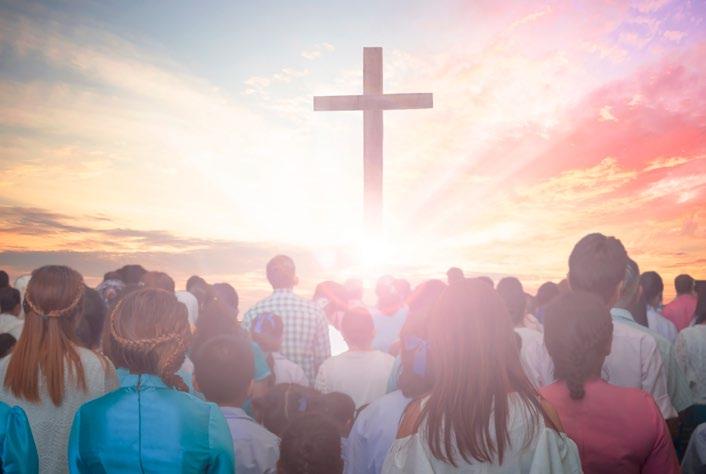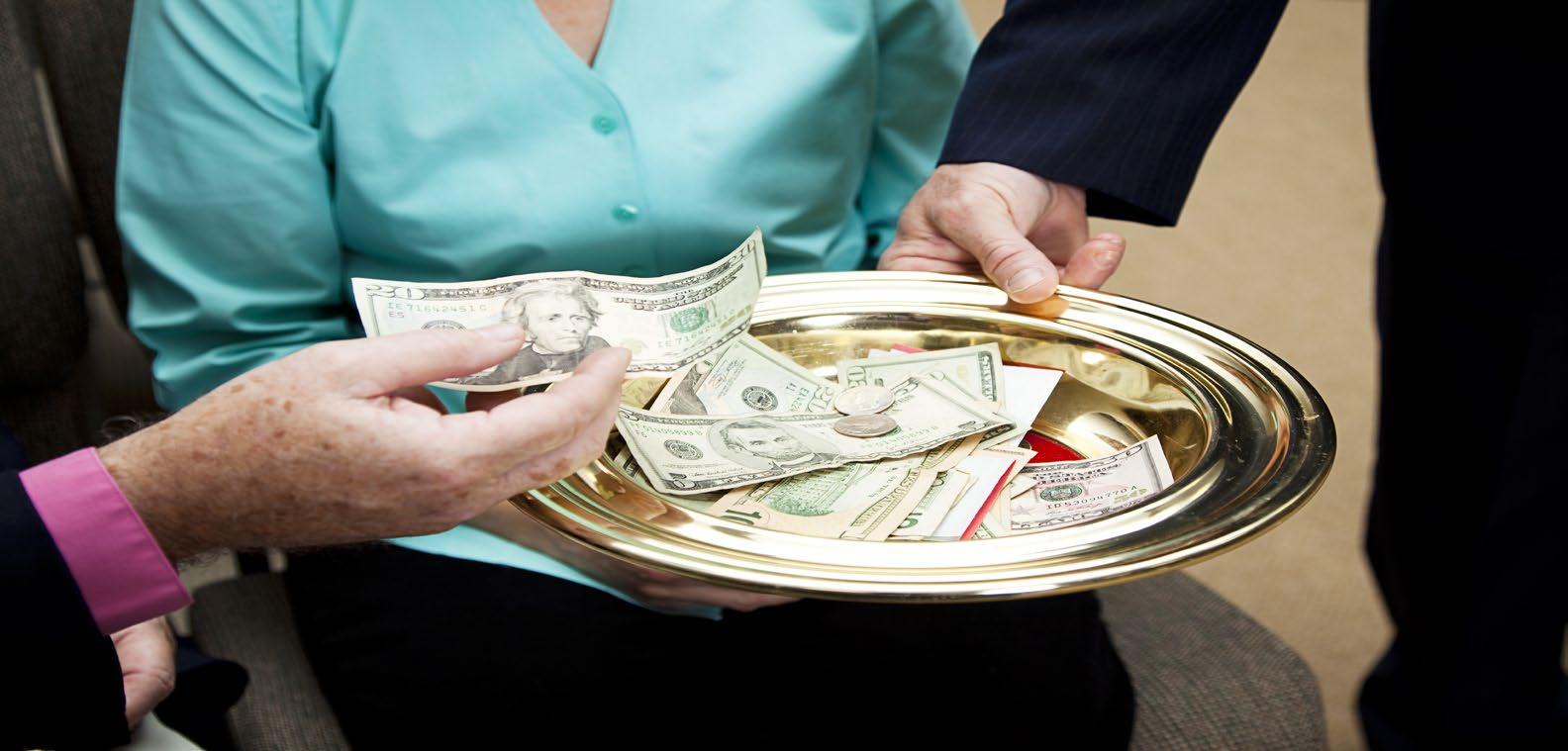
15 minute read
DAY 6: Back to Bethel
DAY 6 | Back to Bethel
“And this stone which I have set as a pillar shall be God’s house, and of all that You give me I will surely give a tenth to You” (Gen. 28:22).
The Bible contains many promises. For many, they are the most beautiful part of the Holy Scriptures. We need these promises because through them, our faith is strengthened. What is the most important promise in the Bible, the promise that man needed even before he fell into sin?

We find it in an explicit form for the first time in Genesis 28:15, and it is, “I am with you.” It is not addressed to a person who, in our opinion, deserves this. God speaks to the one who tricked his brother, lied to his father, and constrained by his brother’s hatred became a fugitive. His name is Jacob, meaning “the deceiver.” The Bible calls this grace; it is what we all need.
Bethel, the Meeting Place With God
Jacob left Beersheba, the place of his brother Esau’s wrath and vengeance, for Haran (Gen. 28:10). There, he was to be deceived and exploited by Laban. Behind was the threat, and ahead was the unknown. The road was a long one, about 800 km (550 miles), and in that time’s conditions, it took about a month. The Bible does not talk about everything that happened during this time, but it presents the experience of a single night that changed Jacob’s life.
Jacob’s grandfather, Abraham, had traveled this road about 125 years before, but in the opposite direction, coming to the Promised Land. There are many other differences between Abraham and Jacob. Abraham was with his family, ser vants, and much wealth, but Jacob was alone and without any material support. But starting with this night, they have something in common, God’s promises: the Promised Land, many descendants, and the blessing that would include all the families of the earth. Jacob did not expect that God would speak to him personally and under such circumstances. He was 15-years-old when Abraham died, and he certainly had the opportunity to learn much about the God of his grandfa ther and father.
It is Jacob’s first encounter with God; he hears God’s voice for the first time. The ladder that reaches the sky descended to the place he was. The word “place” dominates the whole narrative (verses 12, 16, 17, 19), it is not just a geographical location. It is the place that marked Jacob’s life forever; it is the “gate of heaven.” Although it was only a dream, this dream woke him up. The words spoken by Jacob, “The Lord is in this place, and I did not know it,” point to his greatest revelation. God may speak to us in many ways and we may not know it. Jacob needed protection, and God promised to be with him. He needed forgiveness and discovered the ladder on which the angels ascended and descended. The image of this ladder points to the One who descends, Jesus Christ, to “take away the sin of the world” (John 1:29). It doesn’t refer to his past at all, only the future (Gen. 28:13-15).
In this superb narrative, God’s revelation parallels Jacob’s response (Gen. 28:18-22). The answer is called worship. No one can define precisely what worship is, nor does the Bible define it. Worship, humanity’s greatest need and deepest experience, cannot be defined but only experienced. It is attitude, action, obedience, amazement, fear, joy, celebration, mystery, life, dedication—that’s all. Every dimension of life is touched by worship. Worship transforms lives. The devil doesn’t need our goods; he only wants one thing from us: our worship. The last book of the Bible, Revelation, tells us that worship will be the final object of the great controversy between good and evil (Rev. 13:8).
We are invited to walk along with Jacob in this space and to experience true worship.
Vows at the Worshipping Place
It is impossible to meet God, to experience worship, and to remain the same. So far, Jacob’s life has been marked by failures. The place where he arrived and stayed overnight was dominated by darkness. Ellen White describes Jacob’s inner state, which was also laden with darkness: “He felt that he was an outcast, and he knew that all this trouble had been brought upon him by his own wrong course. The darkness of despair pressed upon his soul, and he hardly dared to pray. But he was so utterly lonely that he felt the need of protection from God as he had never felt it before. With weeping and deep humiliation he confessed his sin, and entreated for some evidence that he was not utterly forsaken (1 Ellen G. White, Patriarchs and Prophets, p. 283).”
After God speaks to him, we see a different Jacob. Overwhelmed by God’s promises, by the greatness of His presence, he responds to God by a vow. It is the first vow we find in the Bible, and it is based on what God has already promised. Jacob does nothing new but repeats God’s promises on a much smaller scale, content with just the basic needs of life and the assurance of returning home in peace. He says, “If God will be with me, and keep me in this way that I’m going, and give me bread to eat and clothing to put on, so that I come back to my father’s house in peace, then the Lord shall be my God” (Gen. 28:20, 21).

Behold, I am with you, and will keep you in all places wherever you go, and will bring you back to this land; for I will not leave you, until I have done what I have spoken to you (Genesis 28:15).
In this vow, Jacob promises God three things: first his total loyalty to Him. Jacob’s commitment, in which he promis es to put God first in his life, includes the fact that in this world of sin, this cannot be accomplished without determination and struggle. It’s a choice that must be renewed every day, and the biography of Jacob’s life demonstrates this truth.
The second element of worship is the “stone,” a common thing, which first served as a pillow and was watered with tears. It now becomes a monument of remembrance and the “house of God.” On this stone, Jacob pours oil, a symbol of dedication. The place of public worship, the houses of prayer, must be respected and cherished today as well. Nearby was the city of Luz, but it lost its significance
because of the glory of Bethel. The houses of prayer must be the neatest and most beautiful buildings, and the worship there must befit a place where angels ascend and descend.
.The third element of worship is the tithe that Jacob promises will be “of all” that God will give him (verse 22). Jacob does not conceive of worship without giving. David thought the same thing when he said to Ornan, “Nor offer burnt offerings with that will cost me nothing” (1 Chron. 21:24). True worship always costs. If there are some who consider that it does not cost, they do not know what worship is. If we want to see how much worship costs, let’s look at Golgotha. Our worship cost God the most. He is the “ladder” that Jacob saw coming down from heaven. Ellen White, commenting on Jacob’s promise, cannot help but say with amazement: “Tithes for Christ! Oh, . . . shameful for that which cost so much! From the cross of Calvary, Christ calls for an unreserved consecration. All that we have, all that we are, should be devoted to God (Ellen G. White, Patriarchs and Prophets, p. 188)”
Someone once said that everything important we need to know about God, about men and women, and about salvation is found in the book of Genesis. Here is another aspect that we cannot overlook. Many do not understand why God instituted the tithe system. They get the impression that the only reason is to support the church and its mission. When Jacob promised to be faithful in tithing, there was no organized church, no pastors, no evangelistic institutions. The principle of tithing existed even before the first man and woman fell into sin (Gen. 2:16, 17). The practice of the tithe system

began with Adam, and therefore it was part of Abraham’s experience (Gen. 14:20). The principle of tithing was not instituted to raise funds, but to protect humans from the most insidious temptation: forgetting who the true Owner is. Theoretically, we accept that everything belongs to God, but often, practically, we consider our selves the owners. When this becomes a reality, everything changes in life. Some wonder, however, to whom Jacob returned the tithe, which we know about Abraham. The answer is simple and should be kept in mind by any worshipper: he returned it to God! We always return our tithes to God. The fact that God later established it to be used in the temple (Num. 18:24) and for spreading the gospel (1 Cor. 9:13) is another matter, but He is its true Owner. The tithe has the role of putting order in our material world, putting God in the first place in a practical and tangible way, just as the Sabbath has the role of putting order in the administration of time. Both institutions have the role of protecting us from idolatry. Both belong to God; both are holy; both express our dependence on God; and both remind us that God is the Source of all blessings.

Source of all blessings
Vow Renewal
Each of us, like Jacob, passes through moments in which we promise God con secration and faithfulness in all areas of life. But as we have already mentioned, in order to preserve our consecration, we need vigilance, determination, and daily struggle. God was with Jacob, but this does not mean he was free from trouble, distress, and even failure. That’s why Jacob had to pass through a new experience. It is the agony of another night, when God, wearing a human body, descends to be with him. Here we see again how difficult it is for us to give up control of our lives and let God be its Master. There are so many paradoxes in this unique story.
First, that the Almighty God fights all night with Jacob, a fist of dust, and cannot defeat him (Gen. 32:24, 25). It took a supernatural touch for Jacob to give up, and his defeat becomes a victory (Gen. 32:28). After meeting God, meeting Esau becomes one of the most beautiful and emotional experiences of his life. The real problem is not outside of him, and it is not Esau. It is about letting God be the Leader of his life.
There are many lessons for us in Jacob’s biography, but let’s stop at just one other episode. Chapter 35 of the book of Genesis is once again sad. When we look at Jacob’s family, we find that all the worst things in this world are happening in this family. Seeing your only daughter mocked, being

lied to by your children, and the cruelty manifested in Shechem show the brothers’ true character. Jacob is horrified when he sees herds of animals entering his yard, children crying, and wives screaming. There is a new crisis in Jacob’s life. At the same time, we see God struggling, by His grace, to bring transformation and change to this family that was to become His people.
That is why God intervenes and speaks to Jacob again: “Arise, go up to Bethel, and dwell there, and make an altar there to God, who appeared to you when you fled from the face of Esau, your brother” (Gen. 35:1). Why at Bethel? Bethel domi nates the whole chapter again, it is the place where God was first revealed to him, it is the place where Jacob made the first vow of his life to God. There God prom ised, “I will be with you.” Ten years have passed since Jacob returned to the land of Canaan (30 years after leaving home), but he stopped in Shechem, perhaps for getting about Bethel. Returning to Bethel involves a less enjoyable work. Jacob knew that things were not in order in his family, but he tolerated them. Until now, he always went alone to meet God, but this time he refused to do so. He realizes that he is losing his family, which is why this time his courage is unprecedented, and he demands that everyone partici pate in this event. He knows that worship requires renunciation, cleansing, and con secration, so he commands, “Put away the foreign gods that are among you, purify yourselves, and change your garments” (Gen. 35:2).
What keeps us from putting God first in a tangible way by tithing, sacrificing for God’s house, the place of worship, and also for world mission is idolatry. It can be the idols of materialism, selfishness, self, or any other form. But let’s not forget: idols destroy our lives and families. They are cruel. They demand everything from us, and they don’t offer us anything in return. Jacob had the courage to say that he no longer wanted such things. The idols were buried under the oak near Shechem (Gen. 35:4). Arriving at Bethel, he builds the altar, prepares the sacrifice, and gathers his family around the altar. The sermon Jacob gave there could not be forgotten by anyone, because it was anchored in the experience of his life. This is the place —he says—where God spoke to me for the first time; He promised to be with me, and He kept His word.
God always keeps His word. That was the case then, and it is the same today. The problem is not with God; it is with us. Jacob admits that there were delays in his commitment, but he wants a new conse cration, this time of his whole family.

We are talking about revival and reformation and how much the church needs it. If there was a day in our lives when we promised faithfulness and consecration, now is the time to renew that vow. It is time to return to the Bethel of our beginnings. These are the three essential aspects of the commitment: God in the first place, God’s house or His local or worldwide church, and faithfulness in tithing. If we want a change in our lives for the first time, let us not forget the experience of Jacob. God is ready to forgive the past and give us a new beginning. Bethel is the place of new beginnings as well as the place of renewal of our consecration. The day of this experience is today.

MY PROMISE PERCENTAGE: ____%
I Promise:
TO DEDICATE a percentage (__%) of my income as a regular OFFERING to the Lord.
Questions:
1. How does worship change my life and that of my family?
2. John abruptly concludes his first epistle with the warning, “Little children, keep yourselves free of idols” (1 John 5:21). Why?
3. Are there any delays in my life regarding faithfulness in returning the tithe? What keeps me from committing to God as Jacob did?
c h i l d r e n ’ s s t o r y
Five Times Rewarded
“For God loves a cheerful giver” (2 Cor. 9:7).
Timothy was a 7-year-old boy who loved playing with Legos® very much. He could spend hours patiently building up different Lego® models and inventing all kinds of things from his Lego® pieces. He had only two sets of Legos®: one was a birthday present from his parents, and the other

was from his classmates as an end-of-the-school-year gift. But he loved to mix the pieces and build all sorts of cars, ships, planes, and buildings.
He had just seen a new Lego® model that had come out, which he liked very, very much, and wished he could have. “If I had this model too, which has a lot of special pieces included, I am sure I could invent and built almost everything,” he used to tell his mom. “You can try to save money,” his mom advised him. Timothy started saving money, little by little, but he knew the game was pretty expensive, and he felt bad for having to pay so much for a simple game.
Then one day, an old family friend came to visit and gave Timothy a banknote worth $50! Along with the money he had raised, it was just enough to buy the Lego® set. Just imagine Timothy’s joy! His
first thought was to go to buy it. Then a second thought came to his mind: he remembered that the previous Sabbath the pastor had announced in church that they would have a special collec tion for a mission project in Africa. He felt the urge to give his money to church, even though he wanted the Lego® game really badly!
The following Sabbath, he took the money he had received to church and put the entire sum into the offering basket. His mom was very surprised, as she knew how much he had wanted the game. She also knew that he could not easily earn the amount needed by himself.
Two days later, a woman from his mom’s workplace asked his mom if she wanted some toys for Timothy. Her grandson, who was now grown, had decided to give them away. And guess what one of the toys was? It was a very, very big sack full of Lego® pieces!!! When she gave the bag to Timothy’s mom, the woman said: “My grandson kept these toys the longest, but now he is big enough to not play anymore and is ready to give them away. I think there are more than 10 Lego® games mixed inside.”
You can imagine Timothy’s joy when his mom brought the sack home. Also try to imagine his amazement when he realized he had given up his money for God, but that God had given him way more than he could have bought with his money! Putting God first in all aspects of our lives, including money, is like opening the door for God to bless us and fill our own life with joy! God is always happy to bless the cheerful giver!
Questions:
1. Do you think God needs our money? Why do you think He wants us to return the tithe?
2. How can you share what you have with God and other people?
3. Do you think you can find ways to return the tithe, even though you might not have an income?










